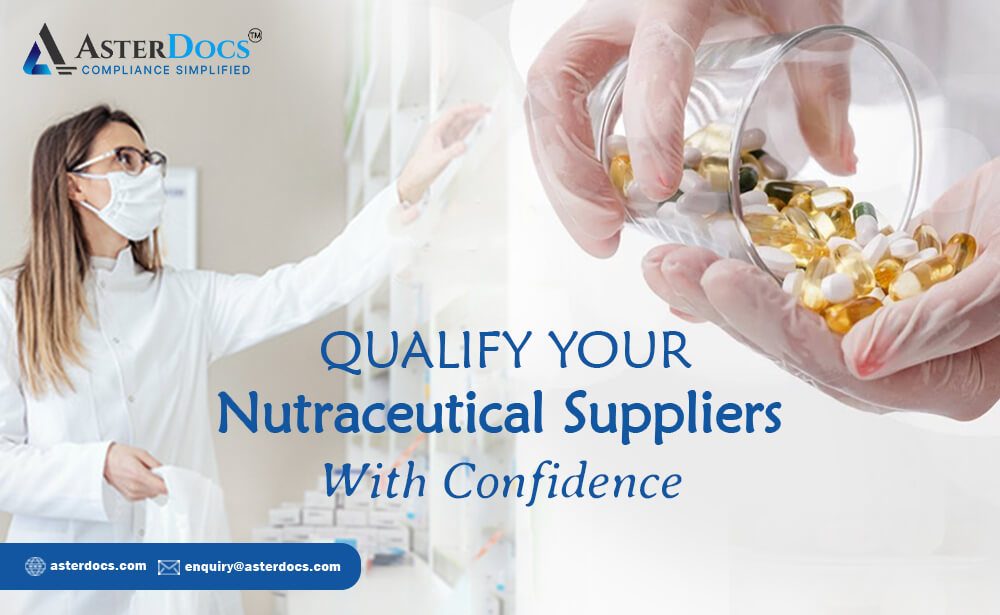When it comes to producing high-quality nutraceutical products, supplier qualification is a critical component of the process. Selecting the right suppliers can ensure that the ingredients used in production are of the highest quality and meet all regulatory requirements.
Nutraceutical manufacturers rely heavily on their suppliers to provide them with high-quality raw materials to ensure their final products are safe and effective.
However, not all suppliers are created equal, and working with the wrong one can lead to a range of issues, including product recalls, reputational damage, and financial losses.
In this blog post, we will discuss some of the best practices for nutraceutical supplier qualification, as well as how AsterDocs can help you streamline your supplier qualification process and ensure compliance with regulatory requirements.
Understanding the Nutraceutical Industry
The nutraceutical industry refers to the production and marketing of products that are derived from food sources, such as dietary supplements, functional foods, and herbal products.
As these products are ingested to provide health benefits, they are subject to regulations that ensure their safety and efficacy.
The regulatory requirements for nutraceuticals vary by country and region, but they typically involve the need to demonstrate safety, quality, and efficacy through scientific evidence.
This can involve testing of raw materials and finished products, adherence to labeling and packaging requirements, and compliance with Good Manufacturing Practices (GMPs).
Nutraceutical manufacturers face several pain points when it comes to supplier qualification. These can include difficulty in obtaining necessary documentation from suppliers, challenges in assessing supplier risk, and maintaining compliance with changing regulatory requirements.
Best Practices for Nutraceutical Supplier Qualification
To ensure the safety and quality of nutraceutical products, it is important to implement best practices for supplier qualification. These include:
Conducting a risk assessment: This involves evaluating a supplier’s potential impact on product safety, quality, and regulatory compliance.
Key factors to consider include the supplier’s history of compliance, quality systems, and experience in the nutraceutical industry.
Creating a supplier questionnaire: A questionnaire can help assess a supplier’s ability to meet your requirements, such as adherence to GMPs and compliance with specific regulatory requirements.
Questions should cover topics such as the supplier’s manufacturing processes, quality control systems, and testing procedures.
Supplier audits: Audits can provide an in-depth assessment of a supplier’s facilities, processes, and quality systems. They can also help identify potential areas of risk and opportunities for improvement.
Monitoring supplier performance: Regular monitoring of supplier performance can help identify issues early and address them proactively. Key performance indicators (KPIs) can be established to track metrics such as on-time delivery, quality, and compliance.
Compliance with regulatory requirements: It is important to ensure that suppliers meet all applicable regulatory requirements. This may involve verifying documentation such as certificates of analysis and GMP certificates.
How AsterDocs Can Help
AsterDocs is a supplier management software solution that can help nutraceutical businesses streamline their supplier qualification processes. Here are some ways AsterDocs can help:
Automated supplier onboarding and approval process: AsterDocs can automate the supplier onboarding process, reducing the time and effort required to obtain necessary documentation and approvals.
Document management and tracking: AsterDocs provides a centralized platform for managing and tracking supplier documentation, such as GMP certificates, certificates of analysis, and supplier questionnaires.
Supplier performance tracking and evaluation: AsterDocs allows businesses to establish KPIs for supplier performance and track them in real time. This can help identify potential issues early and address them proactively.
Risk assessment and compliance management: AsterDocs can help nutraceutical businesses conduct risk assessments of their suppliers and ensure compliance with regulatory requirements.
Customization options: AsterDocs can be customized to fit the specific needs of a nutraceutical business. This includes customizing questionnaires, tracking specific KPIs, and integrating with other systems.
By implementing best practices for nutraceutical supplier qualification and leveraging the capabilities of AsterDocs, businesses can ensure the safety and quality of their products, while minimizing risk and compliance issues.
Conclusion:
In summary, nutraceutical supplier qualification is a critical process that requires careful consideration and attention to detail. By following the best practices outlined in this blog post and leveraging the capabilities of AsterDocs, you can streamline your supplier qualification process and ensure compliance with regulatory requirements.
Contact us today to learn more about how AsterDocs can help your nutraceutical business succeed.













